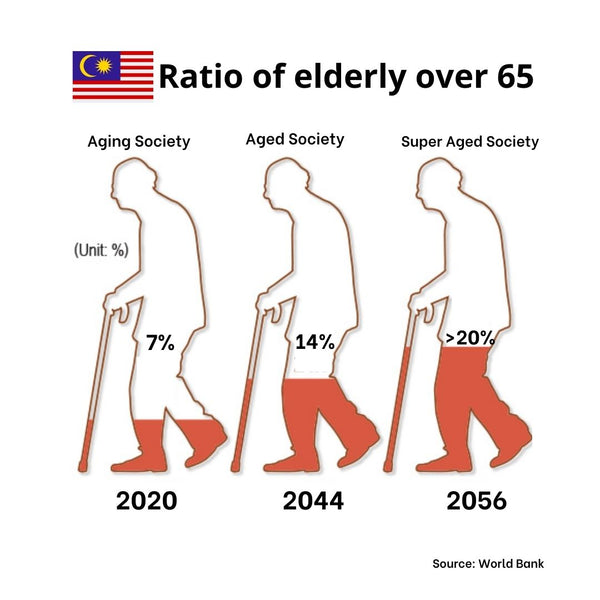World Bank
Rapid aging will be a crucial megatrend affecting Malaysia in the coming decades.

According to World Bank, going from an aging to aged society in just 24 years, the country’s transition happens at a similar pace to Japan’s and follows the trend of other high-income economies.
In 2020, more than 7 percent of the population will be age 65 and above, meeting the conventional international definition of an “aging society”
By 2044, 14 percent of the population is expected to be above 65 years of age making Malaysia an “aged society”
Come 2056, Malaysia will be a “super-aged society”, with over 20 percent of its population above the age of 65.
As this population ages, the demand for products and services that improve their quality of life will follow. We at iElder.Asia in the healthcare industry would do well to prepare ourselves to receive this demographic with the proper goods and services to meet their needs.
Department of Statistics Malaysia
Malaysia is projected to become an aging population by 2030. The combination of declining fertility rates and increasing life expectancy is expected to result in a significant shift in the age structure of the population.
According to the Department of Statistics Malaysia, the proportion of Malaysians aged 60 and above is expected to increase from 9.5% in 2020 to 14.5% in 2030. Furthermore, the number of individuals aged 65 and above is projected to more than double from 2.1 million in 2020 to 4.8 million in 2030.
This demographic shift towards an aging population will have implications for various sectors, including healthcare, social services, pensions, and the labor market. The government and policymakers are aware of these challenges and have been implementing measures to address them, such as developing policies to support active aging, improving healthcare services for the elderly, and encouraging longer workforce participation.

As an ageing nation, a country will normally experience an increase in life expectancy due to better healthcare services and living standards, as well as a decline in the fertility rate.
The patterns of declining fertility rate and expansion in life expectancy have started to become more obvious in Malaysia.
In 2020, Malaysia’s fertility rate declined to 1.7% compared to 2.1% in 2010.
The total population aged 65 years and over is higher at 6.8% of 32.4 million total population, compared to 5% of 27.5 million during the same period.
Malaysia has experienced a rapid demographic change for the past 50 years. The young-age (zero to 14 years) shows a declining trend while the working-age (15 to 64 years) and old-age (65 years and over) indicate the opposite.
Generally, the increase in the working-age population positively implies potential employment supply in the country.
However, a contrasting trend between the young and old-age population suggests that the size of the working-age population will shrink in the long run.
Moreover, further aggravated by the falling birth rates, the country could face difficulties in providing adequate workforce for the labour market, thus impacting the economy.
The increasing dependency of the young-age and old-age population on the working age group is also a concern for Malaysia.

Source: Consumers' Association of Penang

![[5-7 December 2025] MyWellFair](http://ielder.asia/cdn/shop/articles/Dr_Kong_speak_at_My_Well_Fair_692e65ea-b60f-4628-9e7a-d4eb09da0256_700x700_crop_center.jpg?v=1765854001)








![[22 Jan 2026] Talks on Integrative Medicine and Home Improvement Tips](http://ielder.asia/cdn/shop/articles/afternoon_tea_with_AIM_Healthcare_f5300f6f-35d1-496a-ac5a-1d7f3cf80953_700x700_crop_center.jpg?v=1764334538)
![[8 January 2026] Managing Chronic Diseases with Integrative Medicine: A Collaborative Approach (Invitation to Healthcare Professional)](http://ielder.asia/cdn/shop/articles/afternoon_tea_with_AIM_Healthcare_c57790d2-8d2c-46d8-8a6f-51607e217ef2_700x700_crop_center.jpg?v=1764334504)





Leave a comment